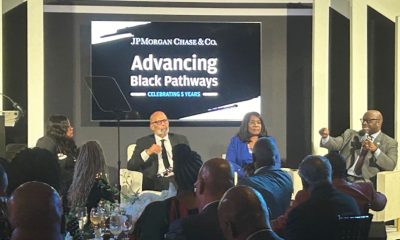Business
Black Women Increasingly Seek the Corner Office
by Jessica R. Key
Special to the NNPA from the Indianapolis Recorder
In business, there’s long been a perception among Black employees that they must work harder than their white counterparts to rise to the top. A recent report suggests Black women in particular are eyeing the executive office more so than their white peers.
A study conducted by the Center for Talent Innovation (CTI), a think tank which conducts research on the challenges diverse individuals face in the workplace, published a report that shows Black women are more likely than white women to aspire to a powerful position with a prestigious title.
“Black Women: Ready to Lead” also uncovers that Black women also perceive a powerful position as the means to achieving their professional goals and are confident they can succeed in the role. Yet, despite their ambition and qualifications, Black women often feel stalled in their careers.
This inertia can be attributed to the unconscious biases and the lack of advocacy these women face in the workplace.
The study was inspired by a report conducted last year by CTI that looked at women in the U.S., U.K. and Germany and found women often were not seeking positions of power. When they dug deeper, they discovered other racial groups had ambivalence to power except Black women.
Mellody Hobson, president of Ariel Investments and wife of film director and producer George Lucas, penned the report’s foreword.
“What sparked this was through some of the interviews conducted. Some of the African-American executives commented they really weren’t seeing an ambivalence to power from Black women,” said Tai Green, senior vice president at CTI and co-author of Black Women: Ready to Lead. “They said executive leadership positions, they find, are a hard sell for this group.”
Green and her team then focused on women in the U.S. to see if the data aligned with their qualitative research. All Black women questioned had a college education and oftentimes had leadership experience outside of their jobs.
“We saw the narrative around Black women was one that isn’t really fraught with talk of the confidence gap or a need to ‘lean in’ as a group, but is far more likely to aspire to positions of power,” said Green.
She added that Black women are three times more likely than their peers to go for the top spot. Why?
Green said Black women responded they were raised hearing statements such as “you need to work twice as hard to be viewed equal to your peers” or “a lot of people struggled and sacrificed to make sure you have the opportunity to compete.”
“There was a deeply rooted understanding of what it means to not have a voice in this country for so long that really drove them to go for it,” said Green. This attitude stemmed from both obligation and personal ambition.
Green said where Blacks are similar to their white counterparts were among five things: the ability to flourish; to excel; to reach their purpose; the ability to empower others and be empowered; and have the ability to earn well.
Looking closely at attitudes about women’s finances, there was a gap. Fifty four percent of white women listed “the ability to earn well” as being important. For Black women, it’s 84 percent.
“We found that Black women list financial independence as a top goal,” said Green.
One possible contributing factor: Black women are more likely to be unmarried and supporting others such as raising nieces and nephews or significantly giving back to their community. To these Black women, having a top job means more money in order to completely and independently fulfill their financial obligations.
Green, who is African-American, said though Black women aspire to a powerful position with a prestigious title, external data shows there are still less than one percent of Black women who are CEOs of Fortune 500 companies.
“When we looked at the barriers to this, we found there is unconscious bias in the workplace. Black women said they felt they needed to conform to the traditional white, male standards in order to fit in or be seen as leadership material,” said Green.
Additionally, there is a lack of sponsorship or people speaking out on Black women’s behalf. Only 11 percent of Black women have senior level advocates. Hobson, who was named one of Time magazine’s most influential people, said instead of primarily looking to another Black person, Black women should look to others outside of their race as an advocate.
Angela Dabney, vice president of global initiatives and transformational giving at United Way of Central Indiana understands why the study may have been conducted, but strongly maintains she believes that Black women aspire to ascend barriers their mothers and grandmothers faced.
“I don’t necessarily think it’s the higher title. It’s getting beyond the societal expectation for them that has been for so many years,” Dabney added. “I feel Black women feel the need to make change, to change the world, and to do that, they need a certain level of power.”
Dabney said instead of chasing titles, Black women should strive for a good work/life balance and do what makes them feel fulfilled.
Dabney said her story reflects her beliefs. She worked in corporate America for many years and found she enjoyed volunteer work. When she moved to Indianapolis, she sought a job in the nonprofit sector and said the United Way is the place where she feels she has the greatest opportunity to make the greatest change. She develops strategies to ensure local initiatives align with nationwide United Way initiatives. She also works with high-level donors.
“Of course it was putting in the long hours, mentors and role models, but I have a passion for what I do,” said Dabney. “Women should go for positions they are passionate about. Going to work is much more fun when it matters to you.”
Green said she didn’t intend for the report to be polarizing, but wanted to show the comparisons between white and Black professionals because the narrative around white women is so widely reported.
“Because Black women’s background, experiences, and challenges differ from that of white women, we thought it was critical to show a side-by-side comparison and for organizations to see that taking a one-size-fits-all approach won’t work,” said Green.
WHAT BLACK WOMEN WANT MOST FROM WORK
• 91% Ability to flourish
• 89% Ability to excel
• 85% Ability to reach for meaning and purpose
• 81% Ability to earn well
• 73% Ability to empower others and be empowered
Bay Area
State Controller Malia Cohen Keynote Speaker at S.F. Wealth Conference
California State Controller Malia Cohen delivered the keynote speech to over 50 business women at the Black Wealth Brunch held on March 28 at the War Memorial and Performing Arts Center at 301 Van Ness Ave. in San Francisco. The Enterprising Women Networking SF Chapter of the American Business Women’s Association (ABWA) hosted the Green Room event to launch its platform designed to close the racial wealth gap in Black and Brown communities.

By Carla Thomas
California State Controller Malia Cohen delivered the keynote speech to over 50 business women at the Black Wealth Brunch held on March 28 at the War Memorial and Performing Arts Center at 301 Van Ness Ave. in San Francisco.
The Enterprising Women Networking SF Chapter of the American Business Women’s Association (ABWA) hosted the Green Room event to launch its platform designed to close the racial wealth gap in Black and Brown communities.
“Our goal is to educate Black and Brown families in the masses about financial wellness, wealth building, and how to protect and preserve wealth,” said ABWA San Francisco Chapter President LaRonda Smith.
ABWA’s mission is to bring together businesswomen of diverse occupations and provide opportunities for them to help themselves and others grow personally and professionally through leadership, education, networking support, and national recognition.
“This day is about recognizing influential women, hearing from an accomplished woman as our keynote speaker and allowing women to come together as powerful people,” said ABWA SF Chapter Vice President Velma Landers.
More than 60 attendees dined on the culinary delights of Chef Sharon Lee of The Spot catering, which included a full soul food brunch of skewered shrimp, chicken, blackened salmon, and mac and cheese.
Cohen discussed the many economic disparities women and people of color face. From pay equity to financial literacy, Cohen shared not only statistics, but was excited about a new solution in motion which entailed partnering with Californians for Financial Education.
“I want everyone to reach their full potential,” she said. “Just a few weeks ago in Sacramento, I partnered with an organization, Californians for Financial Education.
“We gathered 990 signatures and submitted it to the [California] Secretary of State to get an initiative on the ballot that guarantees personal finance courses for every public school kid in the state of California.
“Every California student deserves an equal opportunity to learn about filing taxes, interest rates, budgets, and understanding the impact of credit scores. The way we begin to do that is to teach it,” Cohen said.
By equipping students with information, Cohen hopes to close the financial wealth gap, and give everyone an opportunity to reach their full financial potential. “They have to first be equipped with the information and education is the key. Then all we need are opportunities to step into spaces and places of power.”
Cohen went on to share that in her own upbringing, she was not guided on financial principles that could jump start her finances. “Communities of color don’t have the same information and I don’t know about you, but I did not grow up listening to my parents discussing their assets, their investments, and diversifying their portfolio. This is the kind of nomenclature and language we are trying to introduce to our future generations so we can pivot from a life of poverty so we can pivot away and never return to poverty.”
Cohen urged audience members to pass the initiative on the November 2024 ballot.
“When we come together as women, uplift women, and support women, we all win. By networking and learning together, we can continue to build generational wealth,” said Landers. “Passing a powerful initiative will ensure the next generation of California students will be empowered to make more informed financial decisions, decisions that will last them a lifetime.”
Business
Black Business Summit Focuses on Equity, Access and Data
The California African American Chamber of Commerce hosted its second annual “State of the California African American Economy Summit,” with the aim of bolstering Black economic influence through education and fellowship. Held Jan. 24 to Jan. 25 at the Westin Los Angeles Airport Hotel, the convention brought together some of the most influential Black business leaders, policy makers and economic thinkers in the state. The discussions focused on a wide range of economic topics pertinent to California’s African American business community, including policy, government contracts, and equity, and more.

By Solomon O. Smith, California Black Media
The California African American Chamber of Commerce hosted its second annual “State of the California African American Economy Summit,” with the aim of bolstering Black economic influence through education and fellowship.
Held Jan. 24 to Jan. 25 at the Westin Los Angeles Airport Hotel, the convention brought together some of the most influential Black business leaders, policy makers and economic thinkers in the state. The discussions focused on a wide range of economic topics pertinent to California’s African American business community, including policy, government contracts, and equity, and more.
Toks Omishakin, Secretary of the California State Transportation Agency (CALSTA) was a guest at the event. He told attendees about his department’s efforts to increase access for Black business owners.
“One thing I’m taking away from this for sure is we’re going to have to do a better job of connecting through your chambers of all these opportunities of billions of dollars that are coming down the pike. I’m honestly disappointed that people don’t know, so we’ll do better,” said Omishakin.
Lueathel Seawood, the president of the African American Chamber of Commerce of San Joaquin County, expressed frustration with obtaining federal contracts for small businesses, and completing the process. She observed that once a small business was certified as DBE, a Disadvantaged Business Enterprises, there was little help getting to the next step.
Omishakin admitted there is more work to be done to help them complete the process and include them in upcoming projects. However, the high-speed rail system expansion by the California High-Speed Rail Authority has set a goal of 30% participation from small businesses — only 10 percent is set aside for DBE.
The importance of Diversity, Equity and Inclusion (DEI) in economics was reinforced during the “State of the California Economy” talk led by author and economist Julianne Malveaux, and Anthony Asadullah Samad, Executive Director of the Mervyn Dymally African American Political and Economic Institute (MDAAPEI) at California State University, Dominguez Hills.
Assaults on DEI disproportionately affect women of color and Black women, according to Malveaux. When asked what role the loss of DEI might serve in economics, she suggested a more sinister purpose.
“The genesis of all this is anti-blackness. So, your question about how this fits into the economy is economic exclusion, that essentially has been promoted as public policy,” said Malveaux.
The most anticipated speaker at the event was Janice Bryant Howroyd known affectionately to her peers as “JBH.” She is one of the first Black women to run and own a multi-billion-dollar company. Her company ActOne Group, is one of the largest, and most recognized, hiring, staffing and human resources firms in the world. She is the author of “Acting Up” and has a profile on Forbes.
Chairman of the board of directors of the California African American Chamber of Commerce, Timothy Alan Simon, a lawyer and the first Black Appointments Secretary in the Office of the Governor of California, moderated. They discussed the state of Black entrepreneurship in the country and Howroyd gave advice to other business owners.
“We look to inspire and educate,” said Howroyd. “Inspiration is great but when I’ve got people’s attention, I want to teach them something.”
Activism
Oakland Post: Week of April 17 – 23, 2024
The printed Weekly Edition of the Oakland Post: Week of April 17 – 23, 2024

To enlarge your view of this issue, use the slider, magnifying glass icon or full page icon in the lower right corner of the browser window. ![]()
-

 Activism4 weeks ago
Activism4 weeks agoOakland Post: Week of March 27 – April 2, 2024
-

 #NNPA BlackPress4 weeks ago
#NNPA BlackPress4 weeks agoCOMMENTARY: D.C. Crime Bill Fails to Address Root Causes of Violence and Incarceration
-

 #NNPA BlackPress4 weeks ago
#NNPA BlackPress4 weeks agoFrom Raids to Revelations: The Dark Turn in Sean ‘Diddy’ Combs’ Saga
-

 #NNPA BlackPress4 weeks ago
#NNPA BlackPress4 weeks agoMayor, City Council President React to May 31 Closing of Birmingham-Southern College
-

 #NNPA BlackPress4 weeks ago
#NNPA BlackPress4 weeks agoBeloved Actor and Activist Louis Cameron Gossett Jr. Dies at 87
-

 Community1 week ago
Community1 week agoFinancial Assistance Bill for Descendants of Enslaved Persons to Help Them Purchase, Own, or Maintain a Home
-

 Activism3 weeks ago
Activism3 weeks agoOakland Post: Week of April 3 – 6, 2024
-

 Business1 week ago
Business1 week agoV.P. Kamala Harris: Americans With Criminal Records Will Soon Be Eligible for SBA Loans
























































